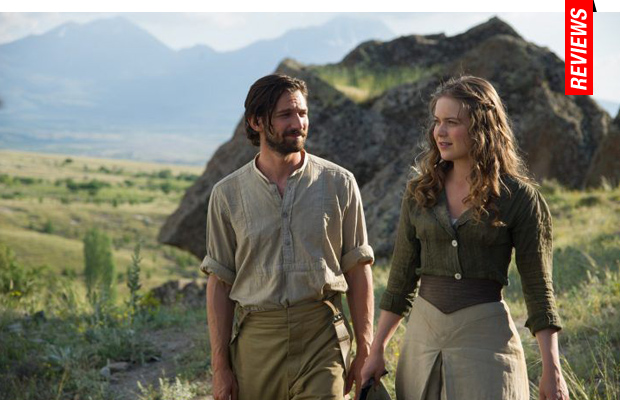The Turkish Lieutenant’s Woman: Ruben Stumbles on Tedious War Time Romance
White and privileged, young Lillie (Iceland’s Hera Hilmar) is determined to shed the yoke of her comfortable existence in 1914 Philadelphia by working as a nurse in a local hospital. Outraged when a black man is denied care based on the color of his skin, the disillusioned Lillie seems to be searching for a cause to champion despite the outrage of her parents. She finds her outlet after a chance meeting with a passionate, handsome mission doctor Jude Gresham (Josh Hartnett), and takes it upon herself to guide a shipment of medical supplies to his remote hospital in Eastern Anatolia. Arriving in Istanbul, she becomes smitten with Ismail (Michael Huisman), a dashing lieutenant in the Ottoman Empire Imperial Army. Requesting his services as a guide, (causing some tension between them as the lieutenant feels this tasking beneath him), they journey to Anatolia, surviving several attacks and the robbery of their goods. Arriving at Dr. Jude’s, Lillie is welcomed as a volunteer nurse despite the sneering cynicism of the overworked head surgeon Woodruff (Ben Kingsley). As war looms over the region, Ismail and Lillie must contend with their growing attraction for one another, while Dr. Jude also sets his sights on the naïve American as a possible mate.
In a different era, the potential of this melodramatic scenario would have made this a hot studio property considering it has all the noble trappings of a significant ‘women’s picture’ in its DNA. But this is the greatest failure of The Ottoman Lieutenant, since we’re supposed to believe the waifish and milquetoast character of Lillie is the desired object of both Huisman’s Turkish lieutenant and Hartnett’s squinty doctor. As written by Stockwell and as performed by Hera Hilmar, Lillie is instantly forgettable. Neither the brooding kind of heroine popularized by the Bronte sisters nor the cavalier composite of historical influences one could compare her to (the puzzlingly problematic rendition of Gertrude Bell portrayed by Nicole Kidman in Werner Herzog’s Queen of the Desert does come to mind in the first frames), there’s nothing intriguing about Hilmar’s Lillie, at least not to pit her as the apex between Huisman and Hartnett, both actors struggling against their own aura of miscasting. As the titular lieutenant, Huisman in particular bears the brunt of providing the charisma Hilmar cannot, straightjacketed as they are by modern prose which can’t quite convey the actual psychological turmoil suggested by a romantic exchange between a Christian and a Muslim in this time and place.
As well-meaning as The Ottoman Lieutenant is in its attempts to shed light on a historical chapter oft neglected in cinematic terms, this hardly provides any specific insight to the atrocities mounted here, including, of course, the Armenian genocide of 1915. Scuffles between the Armenian Christians and Turkish Muslims do take place in Ruben’s film, but the devastation of such a divide is not ever broached—instead, we’re treated to your standard garden variety jabs at consuming passion between the leads, which arrive like clockwork and fade without a trace. Corny patches of dialogue often inspire winces, like an early sequence where Ismail brings Lillie into a mosque. “It’s like being inside God’s thoughts,” she observes with wonder.
A leering Christian villain later holds Ismail at gunpoint. “The question is, am I going to kill you?” he asks. And through it all, it’s hard to register how Lillie actually feels about anything, making The Ottoman Lieutenant just another plodding romantic drama featuring an indeterminately unenthusiastic young woman who we’re supposed to believe will cherry-pick one of her fawning suitors right in time to calibrate the maximum tragic fallout.
★½/☆☆☆☆☆
